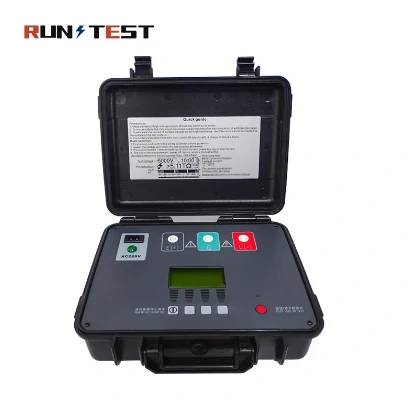What is an Insulation Tester?
Maio 22, 2025
Electrical testing is much concerned with the safety and functionality of the systems essential from a technical aspect. Insulation resistance tester, along with this, is one valuable tool when dealing with electrical safety. The role of this instrument is to assure efficient and safe electrical wiring. We’ll now address the functionality, importance and diverse uses of an insulation tester and how an electric system can benefit from it.
Defining Insulation Resistance Testers
An insulation resistance tester is a device that is made to check the quality of insulation materials in electrical equipment. The service of the device is to indicate the resistance to the passage of electricity in a particular circuit or system during one or more insulation tests. It measures the ability of the insulation to withstand a voltage before the current flow occurs. Insulation resistance tests typically require the application of a higher than system operating voltage between conductors and ground.

Why Use an Insulation Tester?
Safety First: Through the use of an insulation tester, it is possible to inspect the insulation after which one can be certain that it is in good order and can prevent leakage currents.
Predictive Maintenance: Regular monitoring of insulation resistance in electric systems can detect insulation degradation at an early stage. This saves repairs or replacements time and hence prevents unexpected failure of equipment.
Efficiency Optimization: Incorrectly installed insulation can trigger heat loss as an outcome, which in turn will cost you more to run the system.
Compliance with Standards: A huge variety of fields require the compliance of that field with the specific safety standards. An insulation tester helps you in making sure that electrical installations comply with the regulations of the industry, thus, making both the personnel and the equipment safe.
Types of Insulation Testers
Among these are:
Digital Multifunctional Insulation Testers: These models are capable of performing several tests. Basically, these testers can be used with a variety of equipment and perform several tests such as insulation resistance measurement, continuity test, and the earth resistance test.
High-Voltage Insulation Testers: An example of devices like these is the 10kV High Voltage Digital Insulation Resistance Tester. This tester is used especially for testing the insulation resistance of high voltage equipment, which can be particularly hazardous if not properly done. The tester provides safe, reliable, and highly accurate measurements of insulation resistance (IR) and the rest of the high-voltage properties of electrical systems.
Clamp-On Ground Resistance Testers: These are wonderful devices because they conduct ground resistance measurement easily and quickly, and without any disconnections. Also, they can perform many tasks such as testing ground quality in a particular commercial setting.
Key Features of Insulation Testers
Test Voltage Ranges: The test voltage ranges feature is very important when choosing the right device for the job. Look for ones that have many voltage ranges like above 1000V. High-end tech testers nowadays offer up to 10000V.
Accuracy and Precision: Ensure that the tester gives the correct measurements. A perfect insulation tester should have a test voltage accuracy of 100% to 110% of the nominal value.
Auto-Discharge Function: Safety is number one priority. An insulation tester with an auto-discharge function is the one that prevents incidents by discharging the test voltage automatically after the test is finished.
User-Friendly Interface: Find a tester with a straightforward display and simple controls. Such a device will then be easier for the technician to use and interpret the records.
Durability and Portability: In view of the electrical work, it is clear that a durable and portable tester is crucial. Choose products that have the capability to resist external influences and can be transported with minimum effort.
Choosing the Right Insulation Tester
When selecting an insulation testador de resistência, consider the following factors:
Application Needs: Determine the specific requirements of your electrical systems. For high-voltage applications, a high-voltage tester is essential.
Budget: While it’s important to invest in quality equipment, ensure that the tester fits within your budget. Look for options that provide good value without compromising on essential features.
Brand Reputation: Choose a tester from a reputable manufacturer known for quality and reliability. This ensures that you receive a product that meets industry standards.
Conclusão
To sum up, an insulation resistance tester is an indispensable tool for those who work with electrical maintenance and safety. By conducting regular insulation resistance tests, you can make sure that the systems are safe and efficient, avoid big and expensive mistakes and keep up with the standards.
Your safety can be boosted by insulation testers, and they are being of great use in many areas. Therefore, one can contact us choose the right insulation tester today and thus improve the safety and performance of your electrical systems.
